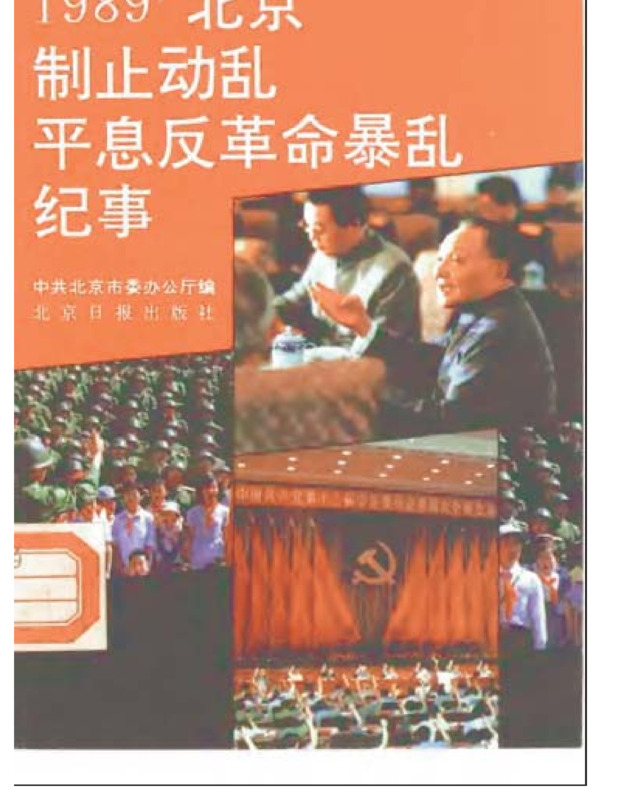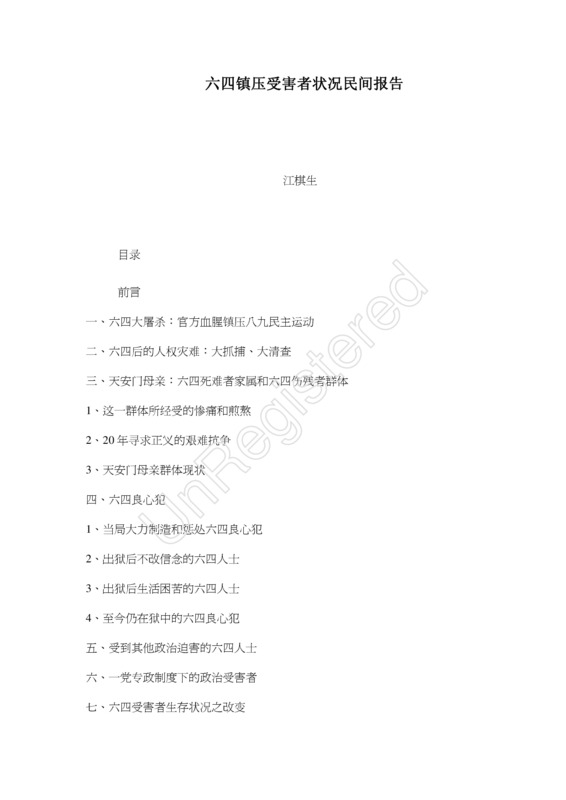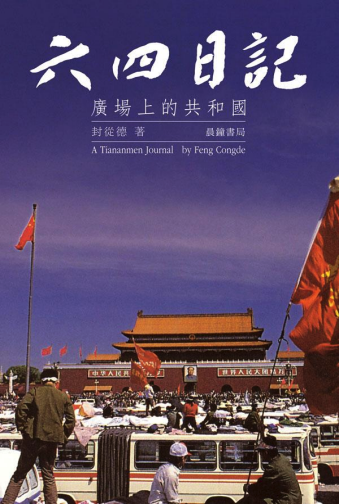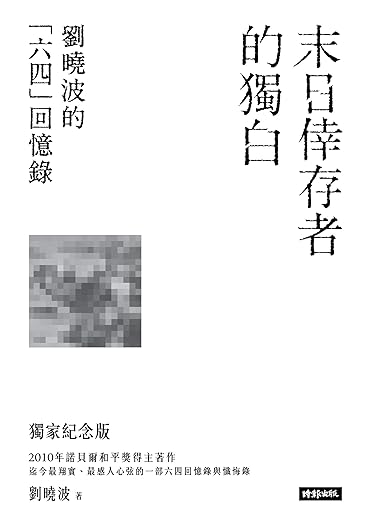Explore the collection
Showing 49 items in the collection
49 items
Film and Video
A Citizen Survey
In August 2008, after the 100-day anniversary of the Sichuan earthquake, rescue teams began to withdraw and the media stopped reporting on the casualties of school employees, teachers, and students. Chengdu environmental worker Tan Zuoren and local volunteers, however, were still searching for the cause of the collapse of school buildings within the ruins. As winter arrived, Tan Zuoren and his colleague Xie Yihui trekked through more than 80 towns and villages in 10 counties and cities, covering a total of 3,000 kilometers. Finally, before the May 12 anniversary, they issued a report of their investigation, which was the first independent inquiry report on the Sichuan earthquake’s impact on schools. At the same time, Beijing artist Ai Weiwei furthered civilian investigation and new volunteers arrived in Sichuan to search for the names of students who died. This documentary is an incomplete record of a civilian investigation and a piece of testimony submitted to the court charging Tan Zuoren with “suspected subversion of the state.”
This film is in Chinese with Chinese subtitles.
Film and Video
Care and Love
This film records the story of Liu Xianhong, a woman from rural Xingtai, Hebei, who contracted AIDS through a blood transfusion in the hospital and decided to publicly disclose her identity and sue the hospital. After fighting in the courts, she finally received compensation. This documentary demonstrates the surging awareness of civil rights in rural China at the grassroot level through depicting the experiences of several families and the concerted efforts of patients to form “care” groups to collectively defend their civil rights. Due to public awareness, media intervention, and legal aid, the government also introduced new policies to improve the situations of patients and their families.
This film is in Chinese with both English and Chinese subtitles.
Book
Chronicle of the 1989 Counter-Revolutionary Rebellion in Beijing
Published in 1989 by the Beijing Daily News, this book is the Chinese government's official account and presentation of the June Fourth Incident. Officially, it describes the June 4 Incident as an upheaval and even stigmatizes it as a counter-revolutionary riot. Some of the accounts presented here need to be judged against other sources.
Book
Collected Papers of Wu Yisan (1)
Writer Wu Yisan is the founder of Hong Kong's May 7 Society, an organization dedicated to the collection, research and publishing of everything related to the anti-rightist campaign in 1957,to restore and present the truth about a period of history characterized by severe persecution of remedial intellectuals. Over the years, Mr. Wu has devoted himself to compiling The Dictionary of Names of 1957 Victims. As the Chief Editor of The Hong Kong May 7 Society Publishing House, he also published The Biography of the Rightists of the May 7.
This book is a collection of his political papers, comprising more than 50 published and unpublished essays primarily written between 2004 and 2009, criticizing CCP from various perspectives, including history, current affairs, and culture.
Book
Collected Papers of Wu Yisan (2)
Writer Wu Yisan is the founder of Hong Kong Five-Seven Society, an organization established in 2007 and dedicated to the collection, research and publishing of everything related to the Anti-Rightist campaign in 1957, to restore and present the truth about a period of history characterized by severe persecution of intellectuals. Over the years, Mr. Wu has devoted himself to compiling *[The Dictionary of Names of 1957 Victims](https://minjian-danganguan.org/collection/1957%E5%B9%B4%E5%8F%97%E9%9A%BE%E8%80%85%E5%A7%93%E5%90%8D%E5%A4%A7%E8%BE%9E%E5%85%B8)*. As the Chief Editor of The Hong Kong Five-Seven Society Publishing House, he also published *The Biographies of the 1957 Rightists* and *[New Biographies of the 1957 Rightists](https://minjian-danganguan.org/collection/%E2%80%9C%E4%BA%94%E4%B8%83%E2%80%9D%E5%8F%B3%E6%B4%BE%E5%88%97%E4%BC%A0%EF%BC%88%E4%B8%8A%EF%BC%89)*.
This book is a collection of Wu’s political essays, including nearly one hundred of his published and unpublished essays and speeches between 1999 and 2017, including historical and current affairs analyses, with an emphasis on commentaries of persecuted intellectuals and political dissidents. These people are often called "traitors of China (han jian)" by CCP, but Wu Yisan argues that the CCP is the real traitor that betrays the country and its people.
Our archive also hosts another anthology of his, *[Is Chen Yi a Good Comrade](https://minjian-danganguan.org/collection/%E6%AD%A6%E5%AE%9C%E4%B8%89%E6%94%BF%E8%AE%BA%E6%96%87%E9%9B%86%EF%BC%881%EF%BC%89)*?
Film and Video
Enemy of the State
On February 9, 2010, Tan Zuoren was tried in the Chengdu Intermediate People’s Court for the crime of inciting subversion against the state. Ai Xiaoming and her team recorded the three days before and after the verdict, the mindsets of Tan Zuoren’s friends and relatives, and how the lawyers carried out their work.
This film is in Chinese with Chinese subtitles.
Film and Video
Faraway Mountain
This movie captures the lives of miners in small coal mines in the Qilian Mountain area of Qinghai Province. At 3600 meters above sea level, the air here is thin. Miners in the small coal kilns labor hard in a working environment without any protection, and usually get silicosis after 5-10 years of work, thus losing their ability to work. If they die in an accident, their families receive only meager compensation. This is a true record of the survival of China's grassroots laborers in the early 1990s.
Film and Video
Garden of Paradise
The year 2003 was known as the birth of the Weiquan—the rights defense–movement, which was marked by the Sun Zhigang incident in Guangzhou. At the same time, a campaign began to get justice for Huang Jing, a teacher from Hunan who was sexually assaulted and killed by her boyfriend. The campaign involved the victim’s family, netizens, feminist scholars and activists, and lasted for several years. This documentary records the process of Huang Jing’s case from filing to post-judgement, and analyzes the broader issue of sexual violence against women in China.
The films in this series are in Chinese with Chinese subtitles.
Book
History of the Chinese Thought Movement
This book is a masterpiece by Chinese scholar Li Honglin. The author was a representative of the ideological liberation movement during reform and opening up and was arrested after the Tiananmen Square incident in 1989. This book summarizes the various ideological purges launched by the CCP since its establishment in 1949.
Book
Inside the bloody clearing of Tiananmen Square
This book is a complete record of the entire process of the forceful clearing of Tiananmen Square in 1989, which began at noon on June 3, 1989, and ended at 10:00 a.m. on June 4th. The author, Wu Renhua, who experienced the June Fourth Incident, describes some of the important events and characters in the book. For example, how Liu Xiaobo, Hou Dejian and other "Four Gentlemen" contacted and negotiated with the PLA martial law forces; how the tanks of the six departments chased and crushed the evacuating students; and how the medical staff put their own lives at risk to save the wounded in the rain of bullets and bullets. The first draft of this book was completed in May 1990, according to Wu Renhua's own account. He fled the mainland in 1992. In May 2007, he published *Inside the Bloody Clearance of Tiananmen Square* in Los Angeles. This was his first monograph on June Fourth. The book has since been updated and reprinted several times.
Article
Jiang Qisheng: Civilian Report on the Situation of June 4 Victims in China
The Tiananmen Square massacre on June 4, 1989 and the subsequent mass arrests and purges created tens of thousands of June Fourth victims. Among them were June Fourth victims who fell into a pool of blood, the June Fourth disabled who were shot, the families of the June Fourth victims and the severely disabled, the June Fourth prisoners of conscience who were sentenced to imprisonment or re-education-through-labor, and the June Fourth victims who were subjected to other political persecution. On the occasion of the 20th anniversary of June Fourth, as part of Chinese civil society's efforts to recover the historical truth and rebuild historical memory, this report gives a basic description of the suffering of the June Fourth victims and their arduous journey over the past 20 years. It also analyzes the systemic factors that have contributed to the victims' suffering and proposes corresponding recommendations on how to change their living conditions.
Book
June 4 Diary: The Republic in the Square
This diary took eighteen years to finalize. Based on a first draft from 1990-1991, it is a complete account of the author's experiences at that time: from his initial participation in the formation of the Preparatory Committee of Beijing University (Beida) to his election as the President of Beida’s Union and as the Deputy Commander-in-Chief of the Forum. It continues up to the time of the evacuation vote by presidency of Forum in the early morning of June 4 and includes other tragic and poignant scenes of history.
Purchase link:https://www.books.com.tw/products/0010436793
Film and Video
Let the Sunshine Reach the Earth
Wang Lihong is a Beijing netizen, civilian journalist, and public service volunteer. Wang was accused of “picking quarrels and provoking trouble” for supporting three netizens in Fujian. On August 12, 2011, the case was heard for the first time in the Wenyuhe Court of the People's Court of Chaoyang District, Beijing. This film includes interviews with Wang Lihong's relatives, friends, defense lawyers and netizens, and records the historical scene of onlookers in the courts.
Ai Xiaoming’s film “Postcard,” also released in 2011, elaborates Wang Lihong’s activism in broader strokes, while “Let the Sunshine Reach the Earth” focuses on the process of her trial.
This film is in Chinese with Chinese subtitles.
Book
Li Peng's June 4 Diary
"Li Peng's June 4 Diary" was published by Bao Park, the son of Bao Tong, the political secretary of former CCP General Secretary Zhao Ziyang. Based on a manuscript of a diary allegedly kept by Li Peng during the June 4 Tiananmen Square incident, the book was originally scheduled to be published in Hong Kong by New Century Press on June 22, 2010. At the time of the June 4, 1989 Tiananmen Square incident, Li Peng was a member of the Standing Committee of the Political Bureau of the Communist Party of China Central Committee (CCP Central Committee) and the Premier of the State Council. The diary covers the period from April 15, 1989 to June 24, 1989, when Li Peng was a member of the Politburo Standing Committee and Premier of the State Council. Bao Park said that, apart from converting the diary from the original simplified Chinese characters to traditional Chinese characters, "nothing will be added, nothing will be subtracted, and nothing will be changed" in the book. The book was later published in the United States.
Book
Major Events, Tiananmen 1989
The author was a key member of the 1989 pro-democracy movement when he was teaching at the Chinese University of Political Science and Law. After the June 4 massacre, he went into exile. Currently, he has settled in Taiwan, where he teaches a course on the truth of the June Fourth Incident at Soochow University and National Chung Cheng University. Wu Renhua has published several books related to the June Fourth Incident. With a master's degree in Classical Literature from Peking University, he has written a book on June 4 that emphasizes the reliability of the sources of information. This book records the major events that happened every day during the June 4 period (April 15th to June 9th).
Film and Video
Memory of Lin Zhao
Independent director Tiger Temple began shooting this film in 2010 and completed it in 2012, with subsequent revisions. The film features interviews with Lin Zhao's former lover Gan Cui as well as interviews with several independent scholars such as Qian Liqun and Cui Weiping. It is a powerful addition to Lin Zhao's memory. This film was selected as one of the top 20 finalists in the 2012 Sunshine Chinese Documentary Awards.
Book
Monologue of a Doomsday Survivor: About Me and June 4
购书链接:https://www.kobo.com/hk/zh/ebook/ZoerWPfG8TiqoXIYwvW2iw。
Book
My Mother :Gao Yaojie
Author Eva writes about her relationship with Gao Yaojie, a Chinese doctor. Dr. Gao Yaojie, who was severely repressed by the Chinese government for exposing the mass infection of Chinese farmers in Henan Province, China, by selling their blood, had no choice but to leave China at the age of 78 and go into exile in the United States. The dissemination of her story is strictly forbidden in China. In this book, author Eva describes Gao Yaojie's noble heart, her story, and her experiences.
Article
New Evidence Concerning the Authenticity of The Tiananmen Papers
Few books on recent Chinese history have caused such controversy as "The Tiananmen Papers". The book is ostensibly a collection of original documents compiled by Zhang Liang, a pseudonym for someone claiming to be a high-ranking CCP official who leaked the papers. The book’s credibility was aided by it being edited by two well-known western scholars of China, Perry Link, then of Princeton University and now of the University of California, Riverside, as well as Columbia University professor Andrew J. Nathan. An introduction was written by Orville Schell, a well-known writer on China who was then a professor at the University of California, Berkeley.
Almost immediately upon publication, the book was criticized for its unclear provenance, a point aided by Zhang Liang’s anonymity. Most scholars agreed that the papers were a mixture of previously released documents from government offices, which were uncontroversial, and accounts of meetings between senior leaders. The latter came under scrutiny, with some saying that the language appeared stilted or seemed to mix in language used in leaders’ public speeches.
This essay by the well-known Hong Kong publisher Bao Pu points out that since 2004, most people seem to feel that the issue of provenance will never be settled but that the documents are still important historically. Bao critiques this, using books published over the past two decades to update the question of authenticity. In careful language, he further questions key points of the documents, showing that they do not match new material, such as memoirs. Bao's conclusion: the Tiananmen Papers are not documents from the CCP’s archive, which is their claim, but rather works of dubious origin that cannot be used to better understand the events leading up to the massacre of civilians on the night of June 3-4, 1989. The top-secret documents, Bao writes, are a “phantom” that must not be used as building blocks for history.



















